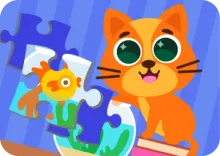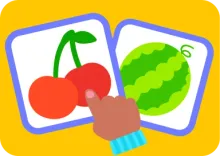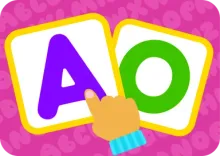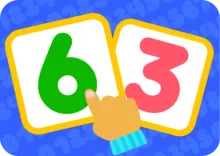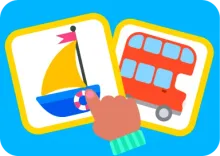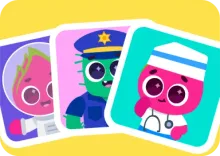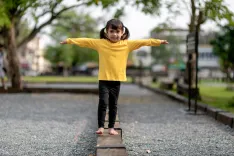Learning to Control Ourselves Fun and Effectively with Games
Impulse control games help kids practice pausing, listening, and following rules under excitement. These activities support self-regulation and focus through short, repeatable challenges that still feel like play.

Impulse control games for kids to practice self-regulation
A child can be smart, curious, love creativity or logical puzzles, but above all this there's another skill that adults often forget when it comes to development. Self-control is one of the most important skills a child masters at an early age. The ability to restrain impulses, wait your turn, and calmly react to disappointment is the key to successful learning, strong social connections, and emotional stability. You can endlessly learn to count and write, but all this pales if a child doesn't possess the ability for self-regulation. However, this skill doesn't appear by itself. Impulse control games for kids are a wonderful way to help a child develop self-control, turning the learning process into an engaging and fun game.
What is Self-Control and Why is it Important?
Self-control, or self-regulation, is the ability to manage your emotions, thoughts, and behavior in various situations. It's not just the ability to obey, but a skill that allows a child to make conscious decisions rather than act under the influence of momentary desires. It's necessary for such things:
- Improving academic performance. Children with developed self-control concentrate better on studies, get distracted less, and cope more successfully with tasks. Self-regulation games for kids allow focusing on goals without getting distracted or giving in to negative frustration.
- Development of social skills. Self-control helps a child wait their turn, share toys, and calmly react to criticism. This is the foundation for healthy communication with peers.
- Reducing anxiety and stress levels. Emotional regulation games that teach impulse control help a child better cope with disappointment and stressful situations, making them more resilient to external factors.
- Ability to cope with disappointment. When a child learns to control their emotions, they get less upset about failures and find solutions to difficult situations faster.
- Development of planning and goal-setting abilities. Self-control is the foundation for the ability to set goals and achieve them, giving up momentary pleasures for long-term results.

Help your child
grow with Keiki
We’ll help you turn everyday screen time
into real learning progress.
Self-Control Games Requiring Movement
These activities for patience connect physical activity with the ability to restrain oneself. They teach the body and mind to work in tandem, which is the foundation for developing self-control.
Red Light, Green Light
One person – the traffic light – stands with their back to the other players. The other children stand at the starting line. When the traffic light says "Green light," children run forward. When they say "Red light," everyone must freeze. If someone moves on red light, they return to start. The first to reach the traffic light becomes the new leader. The game teaches instant stopping and body control.
Musical Statue
Turn on music. Children start dancing. When the music stops, everyone must freeze and become a statue. Whoever moves is out of the game. Such listening games for kids help develop the ability to instantly switch between movement and complete stillness, and also train hearing.
"Simon Says"
One person becomes Simon. They give commands, for example: "Simon says, jump!" Children should only follow commands that begin with "Simon says." If a command was given without these words and someone followed it, they're out of the game. The game trains attentiveness and teaches acting selectively, not impulsively.
Bubbles
Blow soap bubbles. The child's task is to catch them, but only when you give the command, for example, "Catch!" The rest of the time they need to just watch them fly. This game teaches restraining the impulse for immediate action.
Self-Control Games Developing Attention
Equally important are patience games for kids aimed at training concentration and perseverance, which are key components of self-control.
Timed Puzzles
Give the child a small puzzle to assemble. First they can do it at their own pace, then you can introduce a timer. But the game's goal isn't speed, but doing it carefully and without rushing, despite the time limit. Good logic puzzles are also available in Keiki. This teaches the child to concentrate on a task without getting distracted by external factors.
What's in the Box?
Put several objects in a box. Don't open it for several days in a row. The child's task is to show patience and not open the box until the designated day. On the designated day, the child can open the box and play with what's inside. Falls into the category of self-regulation games for kids.
Quiet Hunter
This game requires children to sit quietly, not moving or talking, for a short period of time. You can say: "Whoever sits quietly for 20 seconds wins." Gradually you can increase the time. The game teaches patience and control over your body.
Build by Sample
Give the child a constructor and show a sample they should build. This could be a picture or ready figure. The child's task is to follow the sample exactly, not deviating from it. This game teaches attentiveness and concentration.

Self-Control Games in Daily Life
Games to teach self-control don't have to be original, they can be built into daily routine and become habits. Self-control can be trained not only in games but also in routine activities. This helps the child understand that this skill is important not only during play but also in real life.
On Walks
Before crossing the road, play "Red light, green light." Teach the child to wait for green light even when there are no cars. Another game: "Who first notices..." where you need to find something specific without breaking into a run.
During Meals
The "Wait a minute" game is when you put the child's favorite dish in front of them and ask them to wait a minute before starting to eat. This simple game teaches patience. You can also use unusual utensils, for example, chopsticks, which requires concentration.
Before Bed
Activities for self-regulation should calm at the end of the day so the child sleeps peacefully and soundly. Create rituals that help the child calm down. For example, reading a book, playing in silence, or "who falls asleep first." This teaches the child to control their energy and prepare for sleep.
In the Store
Before going to the store, make a shopping list. The child's task is to follow this list without demanding to buy something else. This teaches planning and self-control.
Build real skills through fun, educational games for your child
Try KeikiGames for kids with ADHD – Training Focus and Attention
ADHD, or Attention Deficit Hyperactivity Disorder, is a condition that affects a child's ability to concentrate, control impulses, and persevere. Games for kids with ADHD are designed to help them develop these important skills in a playful and informal way. While these games are perfect for children with ADHD, they'll also be very useful for any active child who has difficulty sitting still.
Why are special games needed? For children with ADHD, the learning process can be difficult as it's hard for them to maintain attention on one task for long. Games with clear rules and quick feedback help them:
- develop focus – games to teach self-control require concentration on a specific goal;
- improve memory – games where you need to remember sequences train working memory;
- follow rules – clear rules help structure their behavior.
Game examples:
- The already mentioned "Fisherman and Fish" game, as it's excellent for children with ADHD since it requires quick reaction, physical activity, and ability to instantly focus on movement.
- One-leg balance. A simple exercise where you need to stand on one leg helps develop self-control and concentration as it requires complete body control.
- Colors and shapes. Arrange colorful shapes on a table. Ask the child to find, for example, all blue circles, then all red squares. Complicate the task by adding more features. This develops attention to detail.
Such games for concentration are not only useful but also very fun, making the learning process engaging and effective.
Related Games in Keiki App
How Digital Tools Help Develop Self-Control?
Online games for self-control can be no less useful than screen-free activities. Modern apps that involve early development specialists and child psychologists to create thoughtful, useful content consider all nuances of child workload. One such app is Keiki. There are many games here that train patience, perseverance, and self-control:
- Fun Puzzles. The app has puzzles that can be assembled for time. The goal is not just to assemble but to do it focused and carefully.
- Picture Cards. Keiki has memory development games, but they also require a considerable amount of concentration and focus. In the app, they're sorted by different themes for greater convenience.
- Continue the Series. Another way to improve concentration, you need to clearly understand what follows what in a sequence to correctly finish the series in an interactive game.
- Word Building. Any educational games for kids with words, sentences, and reading/writing development also require self-regulation and concentration skills. In this case, tasks are clear but engaging.
Keiki is an app developed with intelligence and understanding of child psychology. Each game in it doesn't overload sensorics and doesn't give excessive psychological burden.
Tips for Parents – Supporting the Child on the Path to Self-Control
Developing self-control is a long process. It's important for the child to feel your support and patience. There are many fun ways to teach self-control to toddlers, but consider additional tips:
- Set a personal example. Children learn by observing parents. If you can control your emotions, the child will follow your example.
- Be consistent. If you set a rule, follow it. Don't change rules depending on your mood.
- Use encouragement, not punishment. Praise the child for their self-control successes. For example, say: "I'm so proud that you could wait your turn!"
- Explain the importance of self-control. Explain to the child why it's important to wait your turn or not shout when angry.
- Start small. Don't demand too much from the child at once. Start with simple games and gradually make them more complex.
- Give the child opportunity to make mistakes. Self-control isn't always perfect behavior. If the child made a mistake, don't scold them, but explain what happened and show how to act differently.
Self-control is a skill that can and should be developed. Impulse control games for kids are a wonderful way to help a child with this. They not only teach controlling impulses but also strengthen your relationship, making the learning process fun and interesting.

